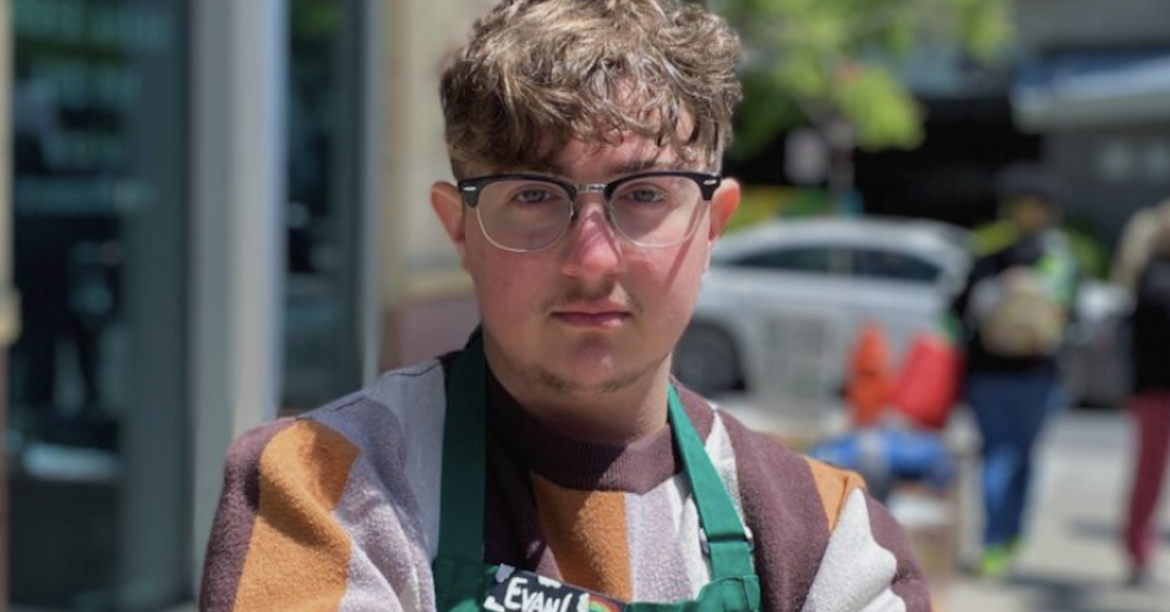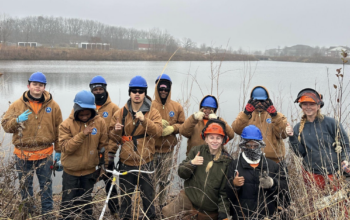Individuals across the world participate in union organizing for various reasons, but one common goal is wanting to help those they work alongside. These four hard workers are just a few of them.
Rick Roeth is a business agent at Teamsters Local 695, which is the chapter associated with Madison. His work is closely focused on employee relations — he has always had a drive for helping others.
David Boetcher is a business agent at the International Brotherhood of Electrical Workers (IBEW) in Madison. Right now, his major role is to set up IBEW workers with companies in the area that need electrical workers.
Matthew Cartwright, one union organizer of the Starbucks on State Street, endured so much with the company that he and his colleagues reached a breaking point and felt unionizing would be the solution.
Evan Sunshine, another Starbucks employee at two locations in New York, had a similar experience. Working at a large corporation, he found that problems with management, hours and timeliness are common, but rarely addressed.
Rick Roeth: a provider
Roeth was born into Teamsters because his dad was a member. So, he has seen the value of the organization from a young age.
“When I first started at Teamsters, it opened my eyes to the need for business agents and the specialness of it because you have a targeted effect on our members, and even their families,” Roeth said.
Teamsters is the largest, most diverse union in America, representing both public and private sectors. Roeth takes on clients ranging from freight to bakery to warehouse workers. His relationships with employees include going on site to monitor events, dealing with grievances and contract bargaining.
“Things can pop up at any time. I do not view this as a 40-hour-a-week job because it is not,” Roeth said.
David Boetcher: an organizer
Boetcher’s job has similar components, particularly his role in the hiring process.
“While new members come in, a contractor who needs workers lets us know. Then we connect the two, and then [the members] go to work for that contract,” Boetcher said.
Electrical work is a fluctuant field, and as it is Boetcher’s job to place electricians, it could cause stress if the demand for electricians is low. However, in Madison, with the university campus, the state government and the Epic Systems campus frequently requiring electrical work, this is rarely the case.
“We have a very stable construction market…There will always be a need to maintain the many buildings the state government has. That’s never going away,” Boetcher said. “Epic and UW also create an incredible need. That just doesn't happen in a lot of places. We have 180 electricians out at Epic right now working every single day.”
Boetcher and his staff at IBEW placed these 180 electricians, along with around 1,120 other electricians in the Madison area — the industry and union are only growing.
“A current problem right now is something that has been predicted for decades, which is the population… There is a need for a lot more construction right now. New technologies are forcing buildings to have to be upgraded,” Boetcher said. “We don't have enough electricians to go out and do all the work.”
This can cause Boetcher and those in positions like his a lot of stress.
“You can’t tell a customer, ‘I’m sorry, we don’t have enough workers. Do you mind putting that off for a year?’” Boetcher said.
Matthew Cartwright: an advocate
With over 15,000 stores worldwide, Starbucks averages earnings of $3,800 per day, per store. This price does not come without challenges and tribulations for its employees, though.
Cartwright moved to Madison with his partner and is a student in online classes. He began working at Starbucks where he, along with other employees, said they started receiving abusive statements and harassment from upper management. So, they began the discussion of unionizing.
“They come from a perspective of ‘We are your bosses. We are above you. We are better than you. We hold the power. And let us just remind you of that power by scaring you,’” Cartwright said.
Issues with management continued even when the union organizers started to hear back from Starbucks corporate. Cartwright and his fellow employees had major issues with Starbucks corporate once they submitted the petition asking to unionize.
“Starbucks has never once accepted a union store,” Cartwright said. “Corporate would come in and…they would put employees in a corner, and they’d be like, let me tell you why unions are bad.”
An election on whether to unionize was triggered in April. Then, on June 1, 2023, the union organizers won the election in an overwhelming victory of 22-1.
“We’ve had these days where we’re understaffed. And when we go to them saying we need mobile orders shut off, they’re much more likely to listen now. Because they know they don't hold the power anymore. That dynamic has changed,” Cartwright said.
Evan Sunshine: a perseverer
Sunshine started working at Starbucks in Woodbury, Long Island, in December of 2019. There was a management change within Sunshine’s first month of working there.
“This was the second manager I’ve ever had…I would have an issue because I couldn’t tell if she was joking with me or not at times,” Sunshine said.
Even though Sunshine had issues with the store in Long Island, when he moved to Ithaca for college, he continued to work at Starbucks.
“I was originally interested in having access to more resources like gender affirming care because I’m trans. I stayed because I was friends with all my coworkers. Even when I switched locations, I enjoyed going to work every day even though it was stressful…I learned to love the art of being a barista,” Sunshine said.
Being friends with coworkers leads employees to unite over what they don’t like at their place of work. So, in November 2021, Sunshine reached out to Workers United after the onsite management not taking proper protocol about a bomb threat.
Sunshine organized an underground campaign by talking to fellow employees, asking each to keep their discussions secret. They launched the campaign to unionize in late January 2022, after Cornell’s winter break.
“And then the union busting began, literally two days later…. The district manager, regional director and regional manager were looking around, evaluating and scrutinizing every little issue, like the grease trap,” Sunshine said. (Grease traps are plumbing devices to intercept greases and solids before they enter wastewater disposal systems.)
“But we don’t use grease at Starbucks, so the old grease was just left to simmer. It created a big smell in the background. Nobody ever maintained it. So that was not good…. The higher leadership tried fixing it…But it ended up causing more destruction and it made the smell worse. And then it broke again. And it spilled out for two more days,” Sunshine said.
This led to employees not being able to go into the back room, where the grease trap was located.
While this situation was taking place, the unionization elections were occurring.
“On Apr. 7, we won…pretty much a landslide victory. I was really happy to see that my campaign was successful, but I had no idea the storm that was coming our way,” Sunshine said.
No one did.
“We went on strike literally a week later because the grease trap overflowed everywhere. It left all the ickiness that was inside, like maggots and stuff, all over the floor,” Sunshine said.
The Starbucks employees had enough.
“We were like, honestly, we’re just going to walk out on strike right now…We were on strike for seven hours and then our demands were met. They said they would fix the trap and clean the mess up properly,” Sunshine said.
Starbucks Media has not responded to any questions about the incident in Ithaca, nor the reasons for unionization of Starbucks on State Street in Madison.
“Going forward it will be important for all of you to recognize that outside labor unions are attempting to sell a very different view of what Starbucks should be,” said Howard Schultz, the CEO of Starbucks, said in a press release.
He does not believe the division that unions cause is the solution.
“We must not be distracted by the different vision being put forward by union organizers at some Starbucks stores. And while not all the partners supporting unionization are colluding with outside union forces, the critical point is that I do not believe conflict, division and dissension – which has been a focus of union organizing – benefits Starbucks or our partners,” Schultz said in the release.






